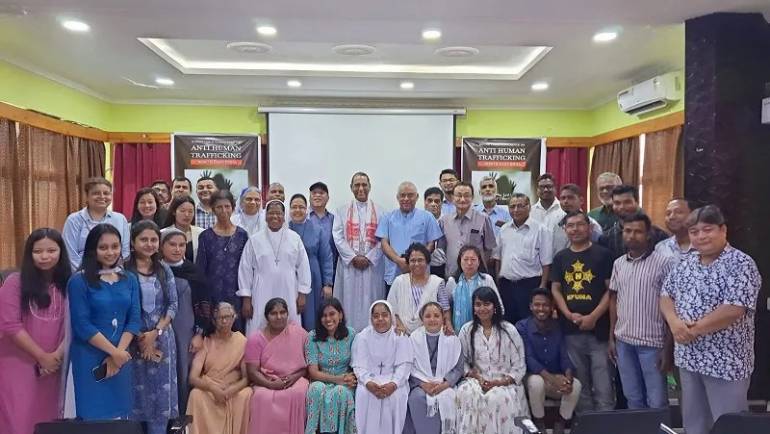Church leaders discuss ways to combat human trafficking in Northeast India

The seasonal floods and accompanying disasters and human misery are fertile grounds for predators who target vulnerable populations.
Against this background, the North East Diocesan Social Society (NEDSSS) and Caritas India zonal office at Guwahati, Assam state, organized a joint conference on June 10 to identify areas to combat human trafficking in northeast India.
The objective of the roundtable conference was to facilitate learning, reflection and common action on the topic of human trafficking. Experience sharing from participants and representatives from organizations working on the issue of human trafficking helped formulate a joint strategy or plan of action to address it.
The participants agreed that human trafficking or modern slavery is a growing crisis. No state in northeast India is immune from this problem. Assam and other northeast become 'source states' for human trafficking.
The conference emphasized the importance of faith organizations to fight against trafficking.
Churches in northeast India have tremendous resources to pool together and address the issues related to human trafficking. These churches have a local presence and capacity to know people and know what’s happening in villages.
They can gather information from villages, and use their influence to find out whom they can collaborate with to bring in training where necessary, and what referral mechanisms exist, the conference recommended.
Other key recommendations that emerged were that the anti-trafficking awareness campaign needs to be strengthened throughout northeast India.
Education of the general public and target populations is a key factor to counter the menace of trafficking.
They are to strengthen the anti-trafficking networks in northeast India, different parts of India and abroad.
The collaboration between the civil society groups and the government agencies is vital. There is a need for local and regional structures and mechanisms for people to collaborate with government agencies, NGOs, churches and other faith traditions.
Connecting with Justice and Hope Foundation, an NGO, with their toll-free no and services are available structures in south India.
Providing safe migration through the help of profile mapping of people leaving for jobs outside the region with village structures and NGOs and Churches can minimize instances of trafficking.
The role of media in preventing, rescuing and prevention of human trafficking should become part of media education and awareness.
Earlier, Bishop Lumen Monteiro of Agartala, in his keynote address highlighted the concepts of human trafficking of prevention, protection, prosecution, and partnership in dealing with human trafficking.
Miss Ruth, representing the Caritas India zonal office in Guwahati, reported on the role of local women agents in the trafficking network.
“Women are lured to become mediators for other girls. During monsoon, flood and relief camps in Assam state became prosperous time for traffickers,” she said.
Father K. Jose SVD, the director of North East Institute of Culture and Religion (a research center in Anthropology, Folklore and Sociology) at Guwahati, pointed out that human trafficking was the third biggest modem crime in the world, after the arms and drugs trade.
“It is estimated that most of the trafficked persons are children and the saddest dimension of the issue is that they are sold or exchanged multiple times,” he said.
Holy Cross Sister Prema Chowallur, the vice president of Amrat Talitha Kum India, shared the network of Catholic nuns who are actively involved in human trafficking prevention and rescue works in India.
During the inaugural ceremony, on behalf of NEDSSS executive director Father Sebastian Ousepparampil, Father Tom Mangattuthazhe welcomed the participants.
The lighting of the lamp was done by the chief guest Bishop Monteiro, guests of honor Reverend W.C. Khongwir, former moderator of PCI, Father Jose, Ms. Chihanphi Luiram, (program associate, Caritas India).
The round table conference came to end with a common prayer and vote of thanks proposed by Father Tom Mangattuthazhe. - Frank Krishner
Radio Veritas Asia (RVA), a media platform of the Catholic Church, aims to share Christ. RVA started in 1969 as a continental Catholic radio station to serve Asian countries in their respective local language, thus earning the tag “the Voice of Asian Christianity.” Responding to the emerging context, RVA embraced media platforms to connect with the global Asian audience via its 21 language websites and various social media platforms.














